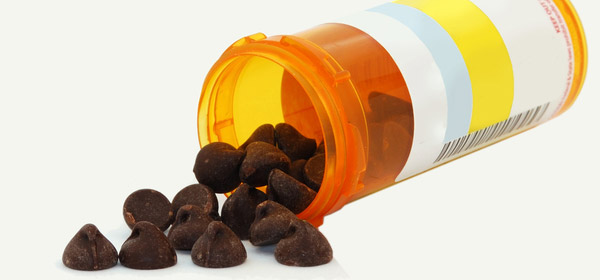I remember the first person I ever met who didn’t like chocolate. I was floored. How could he not like chocolate? Turns out he didn’t like coffee either, which was also surprising but not as shocking as not liking chocolate.
Since then, I’ve met a few people who don’t like chocolate, only two of whom don’t because of the taste. The other two are more worried about their weight, but one I met the other day worries that she actually has a chocolate addiction and so stays away from it entirely.
It got me thinking: is there really such a thing as an actual chocolate addiction?
I mean, we’ve all heard the term ‘chocoholic’ bandied about to describe someone who likes chocolate, but can the term be applied in the same way as ‘alcoholic’?
I did some digging and it turns out it can.
It seems that your brain treats chocolate like a drug, because chocolate contains a substance called enkephalin which makes chocolate almost impossible to resist.
Evidently, enkephalin triggers your brain’s opioid receptors – the very same receptors that react to opiates such as morphine, heroin and codeine, and can also stimulate your impulse to eat.
Chocolate consumption stimulates enkephalin production and, in turn, enkephalin triggers increased chocolate consumption. Basically, once you start eating chocolate, your brain tells you to eat more and more and more and, depending on your willpower, you may literally be powerless to stop yourself.
“The same brain area we tested is active when obese people see foods and when drug addicts see drug scenes,” said lead author of Brain study reveals the roots of chocolate temptations, Alexandra DiFeliceantonio.
While the chemical reactions in your brain tell you to continue consuming chocolate, eating it also leaves a lasting impression.
“You have memories of how great chocolate tasted in the past, and how good it made you feel,” said Dr Melina Jampolis, president of the National Board of Physician Nutrition Specialists.
It’s the combination of sugar and fat that sparks this chemical reaction, both of which are found in abundance in chocolate.
But it’s not just enkephalin that makes chocolate addictive; because chocolate includes another substance called theobromine, which is a bitter tasting stimulant that peps you up after eating it.
Theobromine is toxic to dogs, but for humans it shares similarities with caffeine – another reason chocolate is so addictive. Combine theobromine with the actual caffeine in chocolate, and the pair boosts your mood, concentration and arousal. Sound familiar? Kind of like a drug, no?
Then add the taste of chocolate: that decadent, creamy texture and the feeling as it slides over your tongue and hits the back of your mouth and you can easily see why chocoholics exist.
But as insidious as chocolate may now sound, it also has many health benefits. Some studies suggest that it reduces the risk of heart disease and stroke, relieves stress, helps with weight loss, lowers blood pressure and may even reverse age-related memory loss.
Chocolate with a high concentration of cocoa (i.e. dark chocolate) contains more flavanols, which act as antioxidants that counteract damaging free radicals produced during cell metabolism, reduce resistance to insulin and make blood vessels more elastic, reducing blood pressure.
To get the optimum health benefits from chocolate, all you need is 30g of dark chocolate a couple of times week, or around 6g a day. Any more is purely for enjoyment – or for kicks.
Just don’t get carried away and gourmandise five blocks a day or you will be sick.
If you’re worried about being, or becoming, a chocoholic, here are some tips to curb your cravings:
- Incorporate small amounts of chocolate into your usual diet, rather than restricting yourself, then bingeing. Moderation is the key. Limit eating chocolate to a small amount within half an hour after a meal.
- If you are eating chocolate because you are bored, go for a walk, do some chores, call a friend or read a book.
- Replace chocolate with fruit, nuts or other healthy food. By eating a balanced diet, eating more slowly, avoiding hunger altogether and so keeping your blood sugar level stable, you’re less likely to have cravings.
- Discover if the craving is emotional. Are your cravings related to feelings of low self-esteem or depression? If so, you may need help to address the problem.
- If you can’t help yourself, do not allow chocolate in the house, and ask people you know not to buy you chocolate or eat it in front of you.
- Exercise also stimulates your brain, releasing endorphins which will help to counteract stress, anxiety and depression.
Read more about The science of chocolate.
How much do you like chocolate? Were you aware that it’s actually addictive?
Related articles:
How to eat chocolate
How to make chocolate
Healing powers of dark chocolate

